Yesterday we wrote about Mary Meeker’s annual overview of Internet trends at the Web 2.0 Summit. In this post we do a deeper dive into the Web themes that Meeker explored. In particular we’ll analyze mobile social networking, compare 2009 to previous years and look at the impact of Apple and Facebook on current trends. You can also skip to the conclusion for the main points.
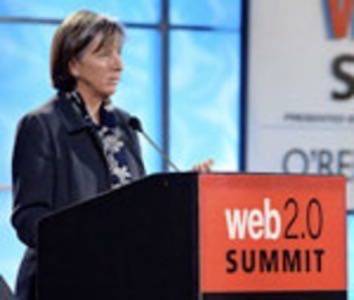
Meeker’s presentation noted that financial markets have rebounded and that the technology sector is now “relatively impressive.” Let’s start by explaining how 2009 is different to previous years.
2001 Redux
Tim O’Reilly noted yesterday in his conference opening that the “[Web] revolution we’re seeing today is as great as the one we saw five years ago.” Mary Meeker had an interesting slide that touched on a similar point – although the dates don’t quite match. O’Reilly compared 2009 to 2004. Meeker pointed to statistics showing that growth in the technology sector in 2009 has the same pattern as 2001.
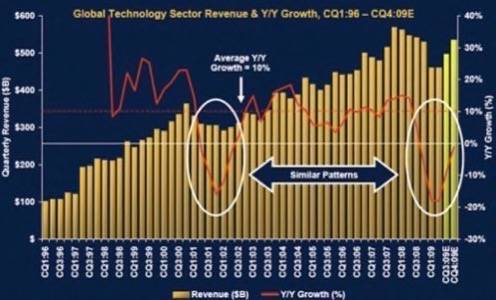
If we correlate O’Reilly’s comments with Meeker’s, it may not be until 2011 that we see a new era of the Web. In other words, what we’re seeing in 2009 is the beginning of a recovery – but it will take a couple more years until the full impact is seen. That makes sense if we view mobile as the key driver of the next Web era, because mobile certainly is very young in its growth curve in the U.S. (it’s more mature of course in Asia and Europe).
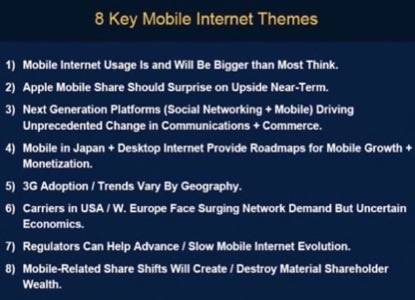
Mobile Social Networking
One of the points on slide 2 is that platforms that combine social networking with mobile will drive “unprecedented change in communications + commerce.” That statement seems a little hyperbolic, but we have undeniably seen an uptick in usage this year of companies like Foursquare, Loopt and Brightkite. Later in the presentation, Meeker predicted that Facebook will be a major player in this market in the near future.
We reported back in March that Foursquare was one of the highlights of the SXSW Interactive event in Austin, Texas. This is the same event where Twitter first generated buzz back in 2007. While it’s too early to call Foursquare the ‘Twitter of mobile social networking,’ it’s worth keeping an eye on that app in particular – given Meeker’s prediction.

Later in slide 36, Meeker noted the importance of location-based services.
Device Explosion
Another key point in Meeker’s presentation was that Internet connected devices will proliferate over the coming years.
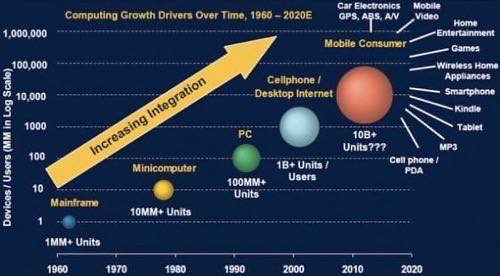
In slide 40, Meeker wrote:
“Mobile devices will evolve as remote controls for ever expanding types of real-time cloud-based services, including emerging category of location-based services, creating opportunities + dislocations, empowering consumers in unprecedented + transformative ways.”
Apple Leading the Charge
In slide 39, Meeker wrote that Apple is the leading hardware and software company currently in the mobile Internet market:
“Near term, Apple is driving the platform change to mobile computing. Its mobile ecosystem (iPhone + iTouch + iTunes + accessories + services) market share / impact should surprise on upside for at least the next 1-2 years.
Long term, emerging markets competition, open mobile web (paced by likes of Google Android) and carrier limitations pose challenges. RIM likely to maintain enterprise lead for 1-2 years owing to installed base.”
In the next slide, Meeker claimed that the iphone/itouch ecosystem exhibited the “fastest hardware user growth in consumer tech history.”
The Growth of Facebook, YouTube & Twitter
We all know that these three services have experienced large growth over the past few years. Slide 42 summarizes that.
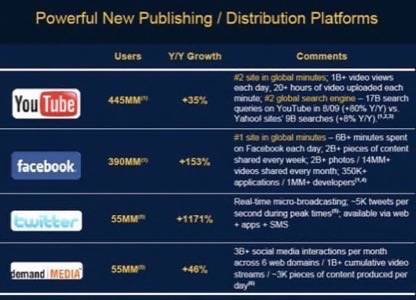
Also note the emergence of Demand Media, which we reviewed earlier this year. We met with Demand Media again yesterday, so a new analysis post is coming soon on this fascinating new media company.
Conclusion
Overall, we at ReadWriteWeb agree with Morgan Stanley that mobile is going to continue to ramp up considerably.
However we think that other trends – such as Internet of Things and real-time Web – were overlooked by Meeker. You can continue to track those and other emerging Internet trends here on our blog.
Also, while we agree that mobile social networking will be a big trend, we think it’s likely that a brand new service will emerge as a major winner in that field. So Facebook may not be the major player, as Morgan Stanley implies in its report. Foursquare may be the big winner, or it could be something completely new. Twitter came out of left field a couple of years ago and it’s now a dominant topic of conversation at the Web 2.0 Summit. What New Thing will we be talking about in 2 years time? Let us know in the comments!
Lead photo: O’Reilly Conferences

















